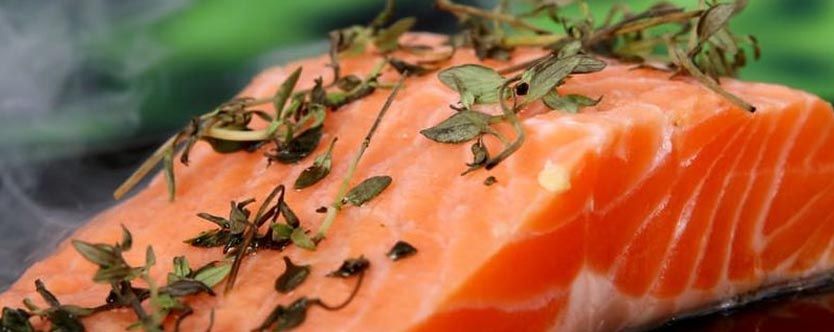
Cholesterol is a substance produced by the liver and is naturally present in the human body. There are two types of cholesterol, namely LDL (bad cholesterol) and HDL (good cholesterol). A balance in the levels of HDL and LDL are essential for maintaining healthy levels of cholesterol in the body.
However, several factors may contribute to an imbalance in these levels, which in turn could result in the occurrence of a heart attack, stroke, or other serious health disorders. While medications and drugs are commonly used to treat high cholesterol, by simply adding the right foods into your diet, one can effectively lower high cholesterol levels.
Learn More: Truth About LDL & HDL Cholesterol
Fish & High Cholesterol
Fish meat is a protein-rich food which contains cholesterol, but it’s high Omega-3 fatty acids content makes it an ideal food for lowering and controlling high cholesterol levels. Here is a list of the top cholesterol-lowering fish varieties:
- Salmon
- Mackerel
- Tuna
- Trout
- Sardines
The above-mentioned fish are high in essential fish oils as well as Omega-3 fatty acids, which makes them excellent foods for treating high cholesterol. However, certain varieties of seafood are high in cholesterol and should be avoided if one already suffers from high cholesterol. The fish varieties which are high in cholesterol are as follows:
- Lobster
- Crab
- Shrimps
- Mussels
- Oysters
- Shellfish
Eat Fish to Lower Cholesterol
Fish is a well-loved protein across the world not only for its amazing flavour, but also for its numerous health benefits. It is loaded essential nutrients, vitamins, minerals, essential fish oils and Omega-3 fatty acids which help keep cholesterol level in check. Thus, here are five good reasons to eat fish to lower cholesterol:
- Maintains healthy cholesterol levels
- Protects against heart attacks & stroke
- Lowers blood pressure
- Reduces risk of diabetes
- Lowers triglyceride levels
Maintains Healthy Cholesterol Levels
Omega-3 fatty acids are an important dietary fat which helps maintain healthy cholesterol levels by lowering (LDL) bad cholesterol and increasing (HDL) good cholesterol levels. Fish such as salmon and tuna are high in Omega 3 fatty acids and can effectively help lower high cholesterol.
Protects Against Heart Attacks & Stroke
The Omega 3 fatty acids found in fish prevent plaque from building up within the artery walls and blocking off proper blood and oxygen supply to the heart and brain. This reduces one’s risk of suffering from a heart attack or stroke.
Lowers Triglycerides
Fish can effectively lower levels of triglycerides, which are one of the main culprits behind high cholesterol levels. Tuna is also known to treat hypertriglyceridemia, a condition caused due to excess levels of triglycerides in the blood.
Lowers High Blood Pressure
High blood pressure is a factor which can largely contribute to high cholesterol. Mackerel and sardines are high in essential fish oils and vitamin D which lower high blood pressure and thus reduce the risk of high cholesterol.
Reduces Risk of Diabetes
High blood sugar and diabetes can contribute to high cholesterol levels. Eating fish can help manage and lower blood glucose levels and improve the body’s response to insulin.
Fish vs Chicken
Fish and chicken are two of the healthiest meat options as they are lean meats, and are high in protein, vitamins and mineral at the same time.
Red meat is a common culprit for high cholesterol levels due to its high levels of unsaturated fats, which are bad for the body. This is why chicken is considered to be one of the safer meat options due to the following health benefits it provides:
- Lowers cholesterol
- Aids weight loss
- Promotes bone health
- Builds muscles
- Lowers blood pressure
- Boosts immunity
- Promotes heart health
However, chicken cannot measure up to the health benefits that fish provides. Fish is naturally low in saturated and trans fats and high in Omega-3 fatty acids, which promote overall good health and provide one with the following health benefits:
- Lowers high cholesterol
- Aids weight loss
- Treats inflammation
- Boosts immunity
- Reduces risk of diabetes
- Lowers high blood pressure
- Protects against heart disease
- Reduces risk of heart attacks & strokes
- Treats depression & improves mood
- Improves sleep quality
Since the human body is incapable of producing Omega 3 fatty acids, it is essential to add fish to your diet, as fish is one of the best sources of Omega-3 fatty acids. So, if you suffer from high cholesterol or simply want to stay safe from it, consume fish at least two times a week. This will definitely help keep high cholesterol levels at bay.
However, if you are a vegetarian or simply do not consume fish there are plenty of other Omega 3 fatty acids rich food options you could consume, such as flaxseeds, chia seeds, walnuts, soybeans etc.
